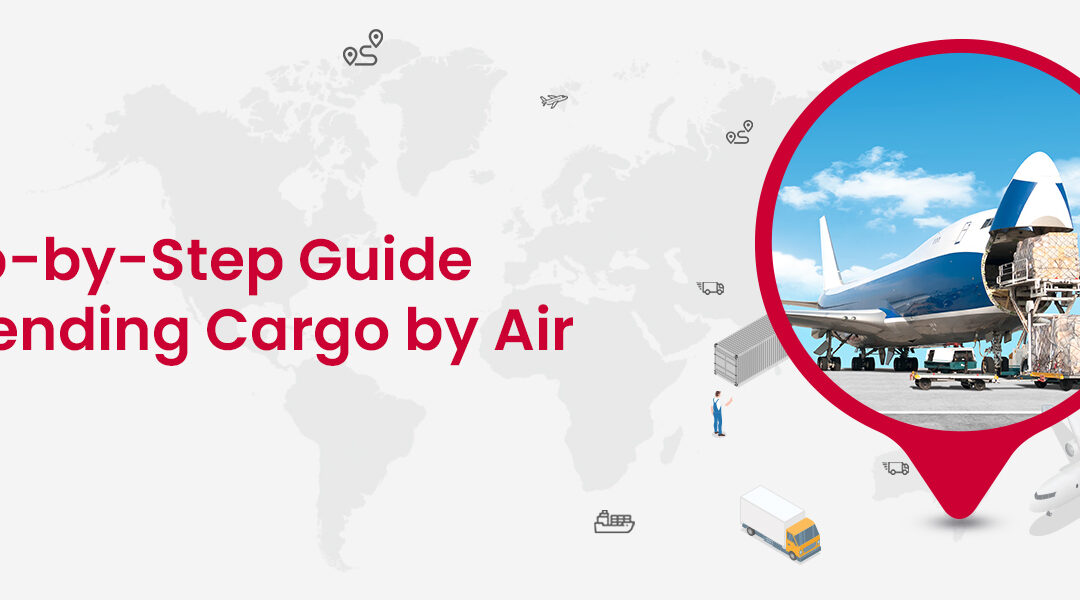With its capacity to bridge vast distances in just a matter of hours, air cargo has emerged as a vital linchpin of global commerce and logistics.
But have you ever stopped to think about how this crucial service operates? What does it take to ensure that your shipment, whether a single parcel or hundreds of cartons, whisks off into the sky and lands safely at its intended destination?
If these questions have been swirling in your mind, in this blog, you’re getting answers to all these questions. Following this blog, you’ll learn the process of sending cargo by air, what documents are required, and the cost per kg of air freight in India.
Step-by-Step Process of Sending Cargo by Air
Step 1: Understanding your Shipping Needs
Before initiating the process of sending cargo by air, it’s crucial to understand your shipping needs. This begins with identifying the type of goods you intend to ship. Whether you’re sending perishables, electronics, textiles, or machinery, the nature of your goods will impact the shipping requirements, regulations, and possibly even rates.
Determining the shipment size and weight is another key aspect, as it directly influences the cost and the type of aircraft needed for transportation. Oversized or heavy cargo might need specialised handling or equipment.
Identifying the destination of the shipment is equally important. This will help you find a service provider that operates in your target region, and understand any specific rules or restrictions in the destination country.
Understanding time sensitivity is the final piece of the puzzle. Do you need the cargo to reach within a day, or is a week’s time acceptable? Faster delivery usually comes at a higher price, so it’s essential to balance urgency with cost efficiency.
Step 2: Choosing the Right Air Cargo Service
Your shipping needs are defined; it’s time to find the right air cargo service. Researching various service providers and comparing their services, rates, and customer reviews will give you insights into their reliability and effectiveness. Companies like NimbusPost’s D2D AC+ offer comprehensive door-to-door air cargo services, catering to different sectors and simplifying the entire shipping process.
Step 3: Documentation
Proper documentation is a cornerstone of air cargo shipping. This generally includes a commercial invoice, packing list, and a shipper’s letter of instruction. Another key document is the Air Waybill (AWB), which serves as the contract between you and the carrier, containing all the shipment details.
Also, cargo services may require you to complete the Know Your Customer (KYC) process, ensuring compliance with anti-fraud and anti-money laundering regulations. Certain types of goods, like hazardous materials or certain electronics, may require special documentation.
Step 4: Packaging and Labelling
Appropriate packaging ensures your cargo withstands the rigours of air transport. Use sturdy boxes, ample cushioning, and secure closure. Labelling is equally vital, as correct labels ensure easy identification and proper handling and prevent misrouting.
Step 5: Cargo Pickup and Handling
Once packaged, the cargo is ready for pickup. Many service providers offer pickup services, where they collect the cargo from your doorstep. At the airport, the cargo is handled following standard procedures, ensuring its safety and integrity.
Step 6: Cargo Tracking and Delivery
Most air cargo services offer cargo tracking, giving you real-time updates about your shipment’s location. Anticipate the delivery by staying updated on the shipment’s status and coordinating with the recipient, if necessary.
Step 7: Understanding Air Cargo Rates
Understanding the cost of air cargo can help you manage your logistics budget. In India, general cargo handling rates vary across airports. Factors influencing air cargo rates include:
- The cargo’s weight and dimensions
- The distance between the origin and destination
- The type of goods
Choose a service provider with transparent pricing, like NimbusPost’s D2D AC+, which ensures no hidden charges, and try to optimise costs wherever possible. For instance, consolidating shipments can be a cost-effective strategy.
Documents Required for Sending Cargo by Air
Just as you wouldn’t drive a car without a license, you can’t send cargo by air without the correct documents.
Commercial Invoice
A commercial invoice is a legal document between the supplier and the customer that clearly describes the sold goods and the amount due by the customer.
Air Waybill (AWB)
The air waybill (AWB) is a contract between the shipper and the airline that states the terms and conditions of transportation. It serves as a receipt of goods for an airline, indicating that the carrier has accepted the goods listed and obligated itself to carry the consignment to the destination airport.
Insurance Certificate
An insurance certificate is proof of an insurance coverage agreement for the shipped goods.
Packing List
A packing list is a shipping document that accompanies delivery packages, detailing the specific contents within. This document is used by customs to verify the cargo being transported, making it an essential part of ensuring hassle-free shipment.
Certificate of Origin (CO)
A Certificate of Origin (CO) is an important international trade document that certifies the goods in a particular export shipment have been wholly obtained, produced, manufactured, or processed in a specific country.
Bill of Lading
The Bill of Lading is a contract between the owner of the goods and the carrier. For sea or inland waterway transportation, it serves as a document of title, a contract of carriage, and a receipt for goods.
Inspection Certification
An inspection certification is a document required for certain types of goods that confirm they have been inspected and meet the quality, quantity, and other contract specifications.
What are the 4 Main Types of Cargo Carried by Air?
General Cargo
General cargo refers to a broad category of goods transported by air that do not necessitate specific handling or storage conditions. This category covers a wide variety of items, including electronics, clothing, machinery parts, and medical supplies. Essentially, general cargo includes a diverse array of products, serving as the backbone of the air freight service industry.
Special Cargo
The special cargo includes goods that require unique handling, storage, or transportation procedures due to their specific characteristics or value. This diverse category ranges from fine art, sensitive equipment, and pharmaceuticals to live stage props for entertainment events.
Temperature-Controlled Cargo
Temperature-controlled cargo is designed to cater to goods sensitive to temperature fluctuations, necessitating specific temperature conditions during transportation. These goods could range from perishable food items to temperature-sensitive pharmaceuticals and certain chemicals.
Hazardous/ Dangerous Goods
Hazardous or dangerous goods refer to items that pose potential health, safety, or property risks during transportation. These goods could be flammable substances, corrosive materials, explosives, or radioactive materials, each requiring special attention and care during transport. Given the potential risk associated with hazardous goods, their transportation necessitates stringent safety measures.
What is the Cargo Rate per kg in India?
The current cargo rates per kilogram in India vary quite significantly. For general cargo, the handling rates at Indian airports range from 74 paise per kg to Rs 2.22 per kg.
If you have special cargo to send, you could expect rates to be between Rs 1.47 per kg to Rs 6 per kg. These rates apply across all types of airports – those under the Airports Economic Regulatory Authority’s (AERA) purview and those outside.
As you can see, this variation can potentially impact the competitiveness of India’s exports and the cost of air cargo logistics as a whole.
Conclusion: NimbusPost Air Cargo Services
Serving as a keystone in the logistics sector, NimbusPost has transformed air cargo services, offering a seamless, door-to-door experience that truly caters to customer needs.
NimbusPost is a leading name in the Indian logistics space, renowned for its emphasis on simplifying the complexity of shipping for its customers.
One of its standout offerings is the Nimbus D2D AC+ service, an air cargo service that provides a comprehensive solution for both businesses and individuals alike. Nimbus D2D AC+ encapsulates the company’s commitment to convenience, efficiency, and reliability.
Why you should choose Nimbus D2D AC+
Door-to-Door Service: NimbusPost takes the hassle out of shipping by offering a door-to-door service. Simply schedule a pick-up, and a team will come directly to your location, collect the shipment, and ensure it gets to its destination.
Global Reach: With a wide global network, NimbusPost can handle shipments to numerous international destinations, making it an ideal choice for businesses and individuals engaged in international shipping.
Services for Various Sectors: Whether you’re in eCommerce, manufacturing, or any other industry that requires air cargo services, NimbusPost’s suite of services caters to a wide array of sectors.




